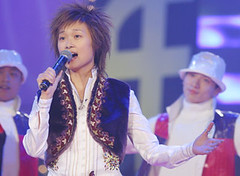I won’t go so far as some commenters have as to call Philip Cunningham a paid CCP shill. But I do have to wonder. The very first time I saw him on CCTV-9 some 2 1/2 years ago I was struck both by his obvious intelligence and the more obvious chip he harbors on his shoulder against the US. He always seems determined to demonstrate that no matter how bad some say the CCP is, the US government is as bad or worse. Tragically, Bush has given Cunningham plenty of grist for the America-bashing mill, and many of the points he makes about Bush can’t be argued (well, they can, but not successfully). But there’s more to America than George W. Bush, who is merely a pimple, an aberration on the face of US history.
His latest piece, an “open letter” to Hu Jintao, is literally loaded with snark and brazen anti-Americanism. I visualized Cunningham experiencing multiple orgasms as he wrote his cunning little screed, which is filled with a child-like glee. Now, I too am quick to point out Bush’s foibles, hypocrisies and sheer idiocies. But Cunningham’s letter is a bit more insidious, actually bearing the message that there’s no difference between the atrocities of the CCP and those of the US government. That’s where I draw a fairly thick line. I despise our president while continuing to love my country, no matter how difficult Bush tries to make it. I fear that Cunningham, deep inside, really does hate America and has fooled himself into believing China is a better place. Bush has damaged America and made me feel at times embarrassed to be an American, but the little Texas guttersnipe can’t erase America’s greatness or neutralize the incredible opportunities this great country offers. And Cunningham should know this (and, I strongly suspect, he does.)
Read the letter and see what I mean by snark and cynicism and America-hating. (And if you can’t access it in China, please let me know and I’ll post the whole thing.)
Oh, and Philip, there is no such word as “irregardless,” and to use it in a printed article reveals a certain intellectual uncouthness. (Sorry, couldn’t resist the snark.)

Comments